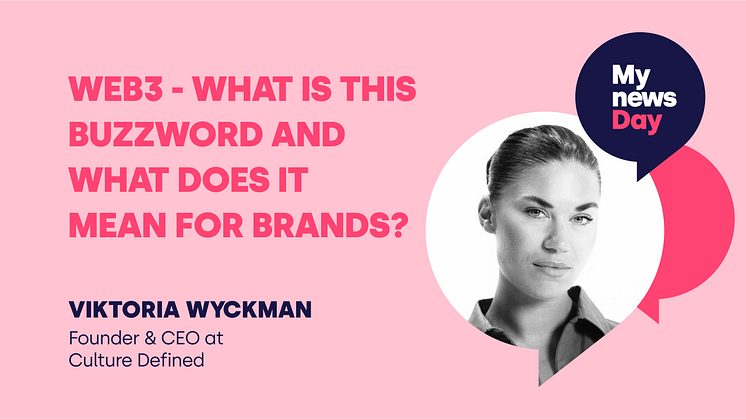
Blog post -
Web3 — What is this buzzword, and what does it mean for brands?
After a few long and interesting — yet confusing — conversations with my two friends Robert Istok and Andrew Rozas, about Blockchain, NFTs, DAO’s (and the list goes on…) a few years ago, it’s fair to say that following these conversations went deep down the rabbit hole when it comes to the Web3 space. It surely gave me a better understanding of it all, even though it’s still a complicated and fast-paced space. However — it’s most certainly the future and will become a commodity in 24 months' time for both brands and consumers.
Let me rewind to when I quit my job at Bambuser and Relatable a couple of months back to pursue my own venture and start my own agency. When you quit your job without having another full-time job at an established company lined up, it gives you an immediate sense of urgency to be up to date with all things future. So, that’s what I did. I went down the rabbit hole for all things Web3 — which resulted in an ability to connect the dots between today and tomorrow; and what it means for brands and consumers. But also make the language more human.
What is Web3, and why is it happening now?
Look at Web3 as the normal next evolution of the internet with some new features and updates that companies and people will be able to leverage across their various businesses and lives. The reason why Web3 is happening now is a reaction to how centralized companies and organizations have handled and monetized people’s data. Web3 aims to transition the internet from a centralized platform to a decentralized platform. Simply put — less power to central organizations aka “ the middlemen” of the internet that provide services in exchange for your data (Facebook is a clear example of this where you, as a human being, are the product), and more power to peer-to-peer services and technologies that allow anyone to participate without monetizing their personal data. All with the end goal of giving more power to the end consumer. In this new world, everything is built upon one system known as the Blockchain.
Think about Blockchain as a kind of bookkeeping service where a lot of computers host data that can be searched by anyone. Users operate this system collectively, and people are given “tokens” for participating, and the tokens can then be used to vote on decisions and much more.
Personally, I believe this is a beautiful transition as we’re building something inclusive, generous, and transparent internet where anyone can benefit. However, this new version of the internet is hard to get a grip on, and it will take some time to adapt and get a full understanding of it.
In the web3 world, on the Blockchain, there are plenty of things happening at the moment, and I’ll try to take you through a couple of trendy ‘buzzwords’ that you might have heard of.
NFTs (non-fungible tokens)
Think of these as digital collectible assets and online files you can buy and sell. Now, there are plenty of marketplaces where you can mint your own NFTs and sell them, but you can also trade, i.e., buy and sell other NFTs. In the early days of this technology, there have been many projects where companies utilize NFTs purely as a digital collectible art asset which is not that different from the offline art world. With this digital asset (your NFT) you own the right to that specific asset, and it’s non-fungible which means it can’t be replaced by something else. You can trade it across various marketplaces like OpenSea, and most NFTs are part of the Ethereum blockchain, which means to buy that NFT you need to buy it with Ethereum (ETH) coins.
Now, the most successful NFTs and NFT ‘brands’ are not only one specific art piece, you’re also becoming a part of a community when you’re purchasing a piece. A community where you can meet like-minded people, play games, get invited to events, and much more. https://boredapeyachtclub.com/ — is a great example of an NFT collection that have bloomed in this space, and today, you buy one of the original ‘Bored Apes’ for hundreds of thousands of dollars… and celebrities such as Fallon, DJ Khaled, Steph Curry, and Post Malone are all owners of ‘Bored Apes’. In other words, they turned NFTs into a membership.
Picture from https://boredapeyachtclub.com
Another example is what Gary Vaynerchuk has done with his NFT initiative ´ VeeFriends, where he sells NFTs with his own artwork on them. In addition to being the owner of this digital art piece, you also become a part of Gary’s community and depending on which NFT you bought, you will be granted access to different experiences, whether that’s a 1:1 zoom call, a keynote speech, a ticket to his VeeCon and much more. In order words. He’s utilizing the NFT technology as ticket sales.
What’s interesting about ticketing and NFTs is that fraud has plagued the ticketing industry in the past, forcing fans to pay higher prices while raising security threats for event organizers. Through misuse of technology, ticketing bots cause chaos, enabling those online to purchase tickets in bulk and sell them on secondary markets at high prices. When utilizing the blockchain to sell tickets, there are no ways to fraud a ticket as it’s transparent for everyone to see the purchase history on the open blockchain source. And this is one area where I see that Web3 will solve a very clear problem.
So, what could Web3 mean for brands?
There are tons of opportunities for brands in this space. But as with any other marketing channel; the most important thing is to integrate it with your other channels and marketing efforts or implement it in a broader business strategy. And at the end of the day — it’s all about reaching a new audience and showcasing that you’re an agile and innovative brand that understands cultural movements. I foresee a few things will be an important part of brands’ strategies going forward, along with questions I would ask myself as a brand.
-
Physical goods will be paired with digital items. Do I sell any products or other assets that can be digitized and turned into NFT collectibles?
-
All tickets will be sold as an NFT. Do I have to sell tickets to events or other happenings, and could we utilize blockchain technology to make the purchase safer for our end consumers?
-
Token-gated experiences. Do I have exclusive experiences that I offer my consumers where I could use NFTs as a membership?
- NFTs as an updated version of a loyalty card. Is it hard to track loyalty and have a 2-way transaction with my most loyal customers? NFTs could be a way to real-time reward my most loyal customers.
We’re only now starting to scratch the surface of Web3, and there is much more to come. I hope this all made sense to you and I’m looking forward to speaking more about this topic at the PR event of the year - Mynewsday 2022.



